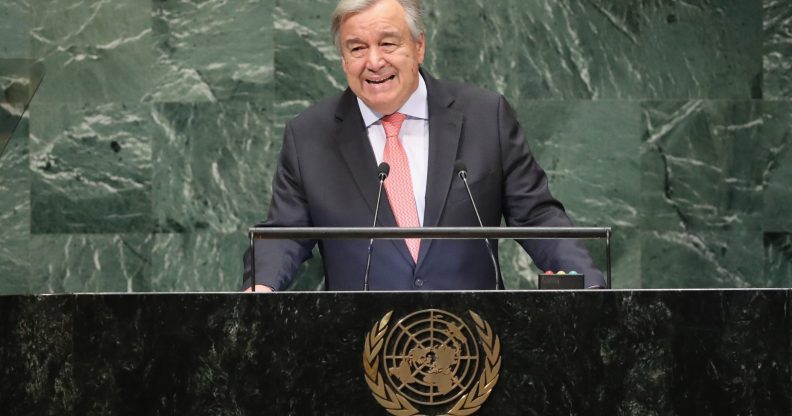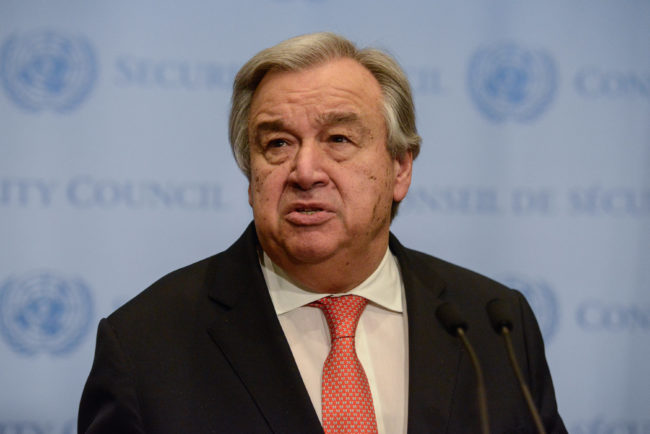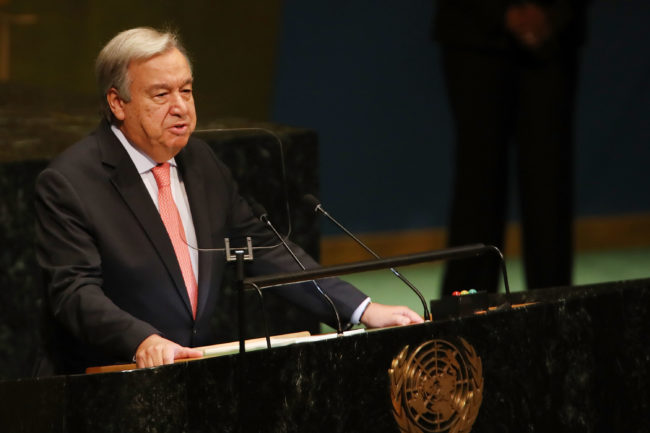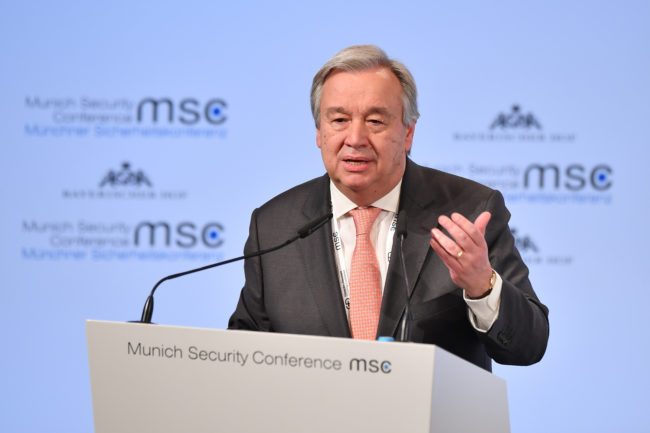UN chief praises India for axing anti-gay law, vows to ‘stand up for’ LGBT+ rights

Secretary General of the United Nations Antonio Guterres addresses the 73rd UN General Assembly meeting on September 25, 2018 in New York City. (John Moore/Getty)
Secretary General of the United Nations Antonio Guterres addresses the 73rd UN General Assembly meeting on September 25, 2018 in New York City. (John Moore/Getty)
The UN Secretary-General António Guterres has praised India for legalising gay sex.
Guterres, who in 2017 succeeded Ban Ki-moon as the UN’s most senior official, has addressed members of the UN LGBTI Core Group, which was established in 2008 to oversee LGBT+ rights worldwide, for the first time.
In the pre-recorded speech delivered on Tuesday, Guterres praised the September 6 ruling of the Indian Supreme Court striking down Section 377, a British colonial-era law banning gay sex.

Secretary General of the United Nations Antonio Guterres addresses the 73rd UN General Assembly meeting on September 25, 2018 in New York City. (Stephanie Keith/Getty)
The UN chief told attendees: “The United Nations stands up for the rights of the LGBTI community.
“Many of its members are imprisoned, abused and even killed simply for who they are or whom they love.”
He added: “Progress has been made in recent years, including this month with the decision by the Supreme Court of India.
“But so long as people face criminalisation, bias and violence based on their sexual orientation, gender identity or sex characteristics, we must redouble our efforts to end these violations.
“As we celebrate the 70th anniversary of the Universal Declaration of Human Rights, let me underscore that the United Nations will never give up the fight until everyone can live free and equal in dignity and rights.”

Secretary General of the United Nations Antonio Guterres addresses the 73rd UN General Assembly meeting on September 25, 2018 in New York City. (Spencer Platt/Getty Images)
His speech was well received by LGBT+ activists, who praised it as an encouraging step.
Maria Sjödin of OutRight Action International told Reuters: “It’s great, as we’ve been waiting to get something longer and more substantial than just a response to a couple of questions that he’s had before.
“It’s really important not to backslide and to ensure that the human rights of LGBTI people continue to be a priority for the UN and the secretary general.”
A more extensive speech was given by UN High Commissioner for Human Rights Michelle Bachelet.
Bachelet said: “More than 70 countries criminalise consensual same sex relationships, and also criminalise transgender people based on their appearance. These laws subject LGBT people to long prison sentences, and in some cases physical punishment. They also implicitly encourage prejudice, hatred and violence.
“But laws can change (…) we need to see more countries taking steps to bring their laws and practices in line with the fundamental equality of all their people.”

UN Secretary General Antonio Guterres (Sebastian Widmann/Getty)
The human rights chief also warned: “It is essential that we defend and protect the LGBTI community, from every kind of violence and discrimination.
“There should be nothing ‘controversial’ about stopping people being murdered, or executed by agents of the State, simply because of who they are or whom they love. Tackling extreme violence does not require new norms.”
The strong comments stand in contrast to US President Donald Trump, who failed to mention human rights at all in his speech to the United Nations General Assembly, beyond disparaging references to the UN Human Rights Council.
“President Trump’s message at the UN General Assembly prioritised national sovereignty over global community and accountability,” Jessica Stern, Executive Director of OutRight Action International, remarked in a statement.
“As an international LGBTIQ human rights organisation, we know that sovereignty and claims to tradition, belief, and custom, have been used repeatedly to trample on the human rights of LGBTIQ people, women, people of colour, religious minorities, and anyone driven to the margins of society. These are excuses States use to advance a patriarchal, nationalistic agenda.”

